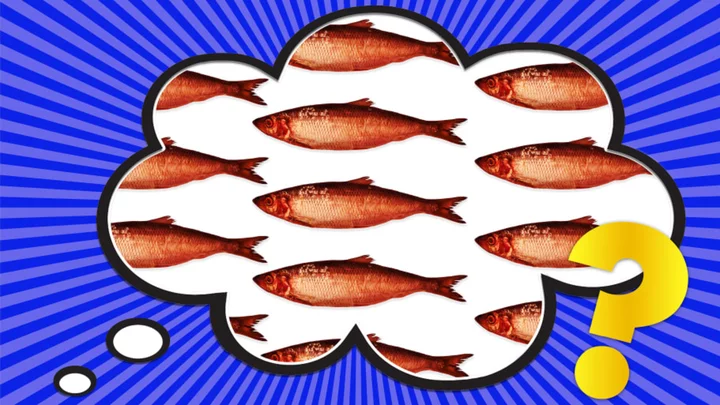You may have seen a red herring in a recent book or movie, but you probably only realized it after the fact. These misleading clues are designed to trick you into drawing an incorrect conclusion, and they're a popular ploy among storytellers of all stripes.
If you’ve seen or read the Harry Potter series—and really, who hasn’t?—then you may recall some of the many instances where J.K. Rowling employed this literary device. That endearing plot twist about the nature of Snape’s character, for example, is likely one of the longest-running red herrings ever written.
Sometimes they aren’t even subtle. Agatha Christie’s murder mystery And Then There Were None directly mentions red herring in reference to a character's death, and a statue of a red herring appears in Lemony Snicket’s A Series of Unfortunate Events. Perhaps most blatantly, a character in the cartoon A Pup Named Scooby-Doo who was constantly being blamed for myriad crimes was named—you guessed it—Red Herring.
But where does this literary device come from, and why is it named after a fish?
For a bit of background: Herring are naturally a silvery hue, but they turn reddish-brown when they're smoked. Long before refrigerators were invented, this was done to preserve the fish for months at a time. They can also be pretty smelly. As Gizmodo’s io9 blog points out, it was believed that red herring were dragged against the ground to help train hounds to sniff out prey in the 17th century. Another theory was that escaped prisoners used the fish to cover their tracks and confuse the dogs that tailed them.
However, io9 notes that red herring were actually used to train horses rather than dogs, and only if the preferred choice—a dead cat—wasn’t available. The idea was that the horses would get used to following the scent trail, which in turn would make them less likely to get spooked while “following the hounds amid the noise and bustle of a fox hunt,” notes British etymologist and writer Michael Quinion, who researched the origin of the phrase red herring.
The actual origin of the figurative sense of the phrase can be traced back to the early 1800s. Around this time, English journalist William Cobbett wrote a presumably fictional story about how he had used red herring as a boy to throw hounds off the scent of a hare. He elaborated on this anecdote and used it to criticize some of his fellow journalists. “He used the story as a metaphor to decry the press, which had allowed itself to be misled by false information about a supposed defeat of Napoleon,” Quinion writes in a blog. “This caused them to take their attention off important domestic matters.”
According to Quinion, an extended version of this story was printed in 1833, and the idiom spread from there. Although many people are more familiar with red herrings in pop culture, they also crop up in political spheres and debates of all kinds. Robert J. Gula, the author of Nonsense: Red Herrings, Straw Men and Sacred Cows: How We Abuse Logic in Our Everyday Language, defines a red herring as “a detail or remark inserted into a discussion, either intentionally or unintentionally, that sidetracks the discussion.”
The goal is to distract the listener or opponent from the original topic, and it’s considered a type of flawed reasoning—or, more fancifully, a logical fallacy. This application of red herring seems to be more in line with its original usage, but as Quinion notes, “This does nothing to change the sense of red herring, of course: it’s been for too long a fixed part of our vocabulary for it to change. But at least we now know its origin. Another obscure etymology has been nailed down.”
A version of this story ran in 2019; it has been updated for 2023.
Are you a logophile? Do you want to learn unusual words and old-timey slang to make conversation more interesting, or discover fascinating tidbits about the origins of everyday phrases? Then pick up our new book, The Curious Compendium of Wonderful Words: A Miscellany of Obscure Terms, Bizarre Phrases, & Surprising Etymologies, out June 6! You can pre-order your copy on Amazon, Barnes & Noble, Books-A-Million, or Bookshop.org.
This article was originally published on www.mentalfloss.com as Where Did the Phrase 'Red Herring' Come From?.









